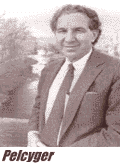Window Rock, Arizona. Price, forming a course on Indian
law, was close to the Navajo Legal Services Program that
would eventually capture the interest of Hilary Clinton
and, later, Bruce Babbitt.
 It was a meaningful beginning to the young
Yale graduate's networking career -- which would
eventually place him in a pivotal and powerful position
to influence the development of U.S. Interior Department
policy. It was a meaningful beginning to the young
Yale graduate's networking career -- which would
eventually place him in a pivotal and powerful position
to influence the development of U.S. Interior Department
policy.
 His UCLA law professor friend brought Pelcyger
into the idealistically minded California Indian Legal
Services, where Pelcyger soon won major attention with
successes in federal court on behalf of the Rincon Band
of California Mission Indians, in the so-called San Luis
Rey water case. His UCLA law professor friend brought Pelcyger
into the idealistically minded California Indian Legal
Services, where Pelcyger soon won major attention with
successes in federal court on behalf of the Rincon Band
of California Mission Indians, in the so-called San Luis
Rey water case.
 Until that case in 1969, Pelcyger says he knew
nothing at all about cubic feet per second or acre feet
or the more exotic terms that he himself would eventually
introduce into the legal lexicon. Such as
"recoupment." Until that case in 1969, Pelcyger says he knew
nothing at all about cubic feet per second or acre feet
or the more exotic terms that he himself would eventually
introduce into the legal lexicon. Such as
"recoupment."
 Again, it was networking among lawyers, this
time with former U.S. Justice Department and then Bureau
of Indian Affairs Counsel William Veeder, who brought
Pelcyger to Pyramid Lake in the early '70s on behalf of
the Native American Rights Foundation. Again, it was networking among lawyers, this
time with former U.S. Justice Department and then Bureau
of Indian Affairs Counsel William Veeder, who brought
Pelcyger to Pyramid Lake in the early '70s on behalf of
the Native American Rights Foundation.
 "I felt it was a terrible
injustice," "I felt it was a terrible
injustice,"

|

Pelcyger told an
Advanced Natural Resources Seminar at the University of
Colorado law school in 1992.
 "The legal system had utterly failed
these people and this resource, and the government had
brought this elaborate water case and had purported to
represent the interests of the reservation, but had
totally sacrificed and subordinated them to the larger
interests of the Newlands Project, and nobody had done
anything about it. It was a travesty." "The legal system had utterly failed
these people and this resource, and the government had
brought this elaborate water case and had purported to
represent the interests of the reservation, but had
totally sacrificed and subordinated them to the larger
interests of the Newlands Project, and nobody had done
anything about it. It was a travesty."
 The Pyramid Lake Tribe already had a lawyer.
In fact, the tribe had gone through a series of lawyers,
especially after questions were raised about possible
influences from gaming interests eager to pick off a gem
in their resort expansion from Reno. The Pyramid Lake Tribe already had a lawyer.
In fact, the tribe had gone through a series of lawyers,
especially after questions were raised about possible
influences from gaming interests eager to pick off a gem
in their resort expansion from Reno.
 Neither that, however, nor, despite what
Pelcyger says, the favoritism toward Newlands, was what
really worried the tribe. In the moves of Senator Paul
Laxalt (R-NV) to secure passage of the long-elusive
Interstate Water Compact with California, the Pyramid
Tribe saw the hints of possible termination of their
federal trust status. Neither that, however, nor, despite what
Pelcyger says, the favoritism toward Newlands, was what
really worried the tribe. In the moves of Senator Paul
Laxalt (R-NV) to secure passage of the long-elusive
Interstate Water Compact with California, the Pyramid
Tribe saw the hints of possible termination of their
federal trust status.
 Termination, they feared, would follow a water
agreement that would allow utility companies and
developers upstream the major control of the Truckee. Termination, they feared, would follow a water
agreement that would allow utility companies and
developers upstream the major control of the Truckee.
 At the time in 1984, in fact, it appeared At the time in 1984, in fact, it appeared
|
 He's Called 'Bob'
He's Called 'Bob' (Part I)
(Part I)
![]() For
more than a quarter of a century now, Robert Pelcyger has
made a career of restoring to Pyramid Lake the water he says
rightfully belongs to the Paiute people and the Cui-Ui
Ticutta sucker fish, who were there when Fremont
"found" the lake.
For
more than a quarter of a century now, Robert Pelcyger has
made a career of restoring to Pyramid Lake the water he says
rightfully belongs to the Paiute people and the Cui-Ui
Ticutta sucker fish, who were there when Fremont
"found" the lake.![]() In that time, Pelcyger has become the nemesis of
the late-comers to the Great Basin -- the farmers, the
ranchers, the families still settling today in the oasis
named Fallon made, in part, from water Pelcyger insists
belongs to the Paiute.
In that time, Pelcyger has become the nemesis of
the late-comers to the Great Basin -- the farmers, the
ranchers, the families still settling today in the oasis
named Fallon made, in part, from water Pelcyger insists
belongs to the Paiute. ![]() Now, he seems near an important victory, and even
at Pyramid Lake itself there are those who wonder for whom
that victory may really be won.
Now, he seems near an important victory, and even
at Pyramid Lake itself there are those who wonder for whom
that victory may really be won. 
